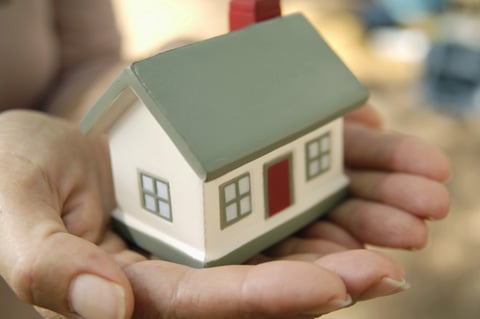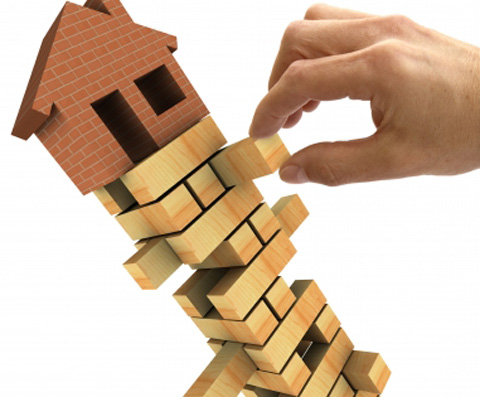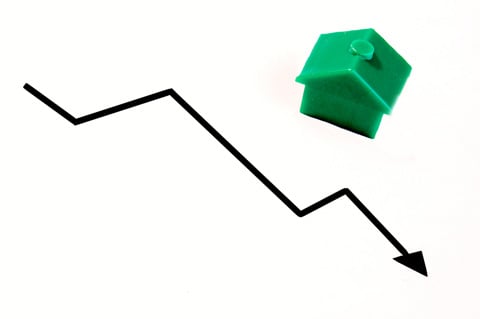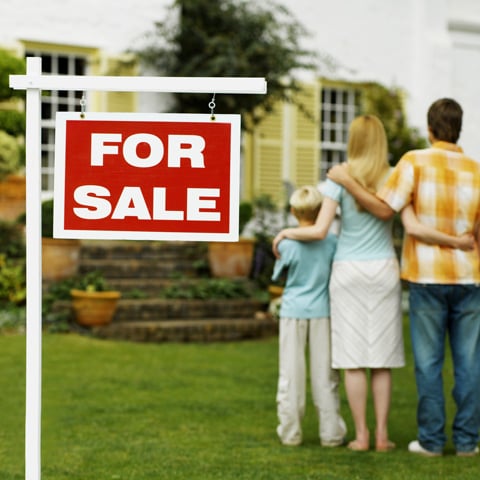What with the lowest housing prices in a generation, you would think that anyone in a position to buy a home would jump at the chance. But in fact, as Victoria Pauli concurs, the housing collapse has made many people think twice about home ownership.

Home ownership isn't so tempting now. Image courtesy of Inside Real Estate
Pauli, 31, a property manager, recently signed a new one year lease on the home she rents in Fair Oaks, Cal. turned down the chance to buy.
“It’s simply not worth it,” she explained. “I’ve seen people whose homes have had their value sliced in half, and I’ve seen a few people lose their homes too”.
With the housing collapse now into its fifth year, there is a big drop in the number of people who consider a home a safe investment. At the end of last year, only 64% of respondents thought so compared with 83% in 2003.

Buying risk. Image courtesy of Short Sale Foreclosure Blog
According to Michael Lea, a San Diego State University finance professor, the whole magnitude of the housing collapse has changed the way many people view ownership permanently.
“Even though the economy is getting better, many people have simply lost confidence in it now, and won’t ever buy a home,” he theorized.
It seems that a lot of people have finally realized that no matter what the situation is, investing in a home is not risk-free. As Michelle Meyer, an economist with the Bank of America Merrill Lynch Global Research organization says, “We all know someone who has got into trouble with their mortgage, or someone who cannot sell their home.”
At the end of last year, more than 11 million homes in the U.S. were valued at less than their mortgages, while another 2.4 million borrowers are on less than 5% equity, meaning any more prices drops will put them underwater. Altogether, this amounts to 28% of mortgaged residences in the country.

Home ownership is going down. Image
The future doesn’t look that great either, according to one survey, which showed the number of Americans planning to buy a home tumbling by 23% in the last month, says the research firm Conference Board.
Not everyone agrees though. The Mortgage Bankers Association told us that it expects buying activity to pick up again once the job market improves. “This will lead to a greater willingness to purchase,” they said recently.
One reason for this confidence is that borrowing costs are cheaper than most people can remember. According to Freddie Mac, a financier based in Virginia, a 30 year mortgage in the U.S. right now is just 4.84%, just up from 4.69% in 2010, which was the lowest rate since 1972.

Homes are not selling. Image courtesy of Live Trading News
Borrowing costs are expected to shoot back up again, starting now, and so now is an amazing time to buy property, says Robert Stein of First Trust Portfolios LP. He thinks that a lot of people will kick themselves if they don’t buy now while the time is right.
However, it seems that cheap financing alone is not enough to nudge buyers into action. As Federal Reserve Chairman Ben Bernanke points out, “Many lenders are being more selective about who they loan money to.”
“Mortagages are difficult to obtain right now, and many people are still worried about further declines in property prices,” explained Bernanke.
Making matters worse, the rules may be tightended up even more if Fedearl Regulators get their way. Among the new rules they are proposing is that bond issuers and banks will have to keep a stake in any mortgages they provide security on, if the borrower has a poor credit history, or cannot afford a 20% down payment.

Interest rates are at record lows. Image courtesy of Bankaim
That means that anyone not meeting the new criteria would be faced with paying higher interest rates.
The fact that the present administration are also considering phasing out Fannie Mae and Freddie Mac presents a risk of further increasing home ownership costs. The two companies have historically held interest rates in check, and so their elimination could see things spiral out of control, thinks Richard De Kaser, from the Boston-based Parthenon Group.
Current home ownership statistics probably spell out the true situation better than anyone else can explain things. The latest figures from the Census Department show that the rate of home owners in the U.S. has dropped to its lowest level in a decade, just 66.5%.

Professor Michael Lea. Image courtesy of San Diego Metro
This rate is expected to drop even further, according to Prof. Lea in San Diego. He said he expects the rate will drop by at least another point in the next year or two.
“While many people may still aspire to home ownership, they will also be a lot more realistic,” says the professor.
Not so in the case of our California renter Ms. Pauli though. Paying just $1,500 a month for a three bedroom home, compared with the $2,800 average payments that her neighbors who bought their homes pre-2007, has showed her that buying is just not worth the risk.
“Even with housing prices so low right now, I just can’t see myself buying,” she told us. “I prefer being able to sleep at night rather than worrying about the price of my home.”
It's interesting that people would buy a home using someone who does not think that homes are worth buying.